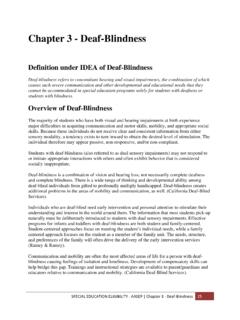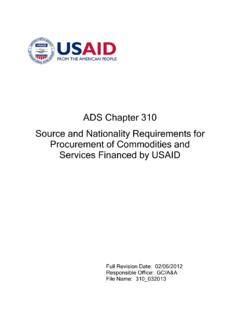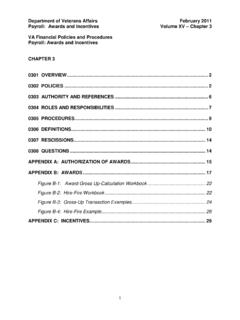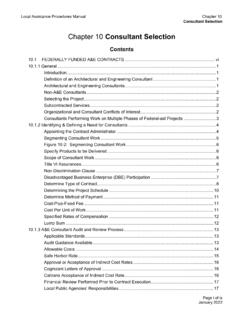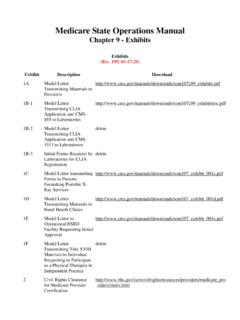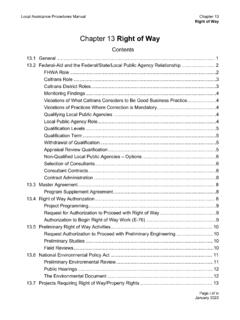Transcription of Chapter 13 - Annual Review and Revision of the IEP - AASEP
1 Chapter 13 - Annual Review and Revision of the IEP. Each student with a disability must have his/her IEP reviewed at least annually. It can be reviewed sooner if a parent or teacher feels that the program and services defined on the student's IEP are not meeting the student's needs. The participants at the meeting should Review the student's current IEP to determine whether or not the goals and objectives have been met ( , whether the criteria specified for the individual objectives have been achieved).
2 In order to make this determination each service provider should have gathered specific information through observation, teacher made or commercial tests, work samples, etc. If the goals and objectives have not been met, the service provider should be able to offer specific reasons based on the information s/he has gathered. Based on a determination of this year's present level of performance, related goals and objectives should be specified. Finally, the services the student needs to meet future goals and objectives should also be noted.
3 Parents, teachers or others can request that an IEP meeting be held for purposes of Review or Revision . The decision regarding if, when, and where the meeting will be held rests with the District, although collaboration with parents is expected. The District should grant any reasonable request for an IEP meeting. Any changes in an IEP, including changes in the short- term objectives or benchmarks, and changes in the amount of services listed in the IEP, require an IEP meeting. The IEP must be reviewed at least annually.
4 To the extent possible, the local educational agency shall encourage the consolidation of reevaluation meetings for the child and other IEP team meetings for the child (20 USC 1414 d 3 E). A public agency must initiate and conduct meetings periodically, but at least once every twelve months, to Review each child's IEP, in order to determine whether the Annual goals for the child are being achieved, and to revise the IEP, as appropriate, to address: (a) Any lack of expected progress toward the Annual goals and in the general curriculum, if appropriate; (b) the results of any reevaluation; (c).
5 Information about the child provided to, or by, the parents; (d) the child's anticipated needs; or (e) other matters. A public agency also must ensure that an IEP is in effect for each child at the beginning of each school year It must ensure that the IEP contains the necessary special education and related services and supplementary aids and services to ensure that the student's IEP can be appropriately implemented during the next school year. Principles of IEP Development AASEP | Chapter 13 Annual Review and Revision of the IEP 112.
6 Otherwise, it would be necessary for the public agency to conduct another IEP meeting. Although the public agency is responsible for determining when it is necessary to conduct an IEP meeting, the parents of a child with a disability have the right to request an IEP meeting at any time. For example, if the parents believe that the child is not progressing satisfactorily or that there is a problem with the child's current IEP, it would be appropriate for the parents to request an IEP meeting. If a child's teacher feels that the child's IEP or placement is not appropriate for the child, the teacher should follow agency procedures with respect to: (1) calling or meeting with the parents or (2) requesting the agency to hold another IEP meeting to Review the child's IEP.
7 The legislative history of Public Law 94-142 makes it clear that there should be as many meetings a year as any one child may need (121 Cong. Rec. S20428-29 (Nov. 19, 1975)(remarks of Senator Stafford)). Public agencies should grant any reasonable parent request for an IEP. meeting. For example, if the parents question the adequacy of services that are provided while their child is suspended for short periods of time, it would be appropriate to convene an IEP. Who Must Participate in the Meeting to Review the IEP?
8 The IEP team needs to conduct the Review of the IEP. Team members include: The student's parents At least one general education teacher of the student At least one special education teacher of the student A representative of the LEA. An individual who can interpret the implications of evaluation results Other individuals who have knowledge or special expertise regarding the student (at the discretion of the parent or agency ). This includes related service providers as appropriate The student when it is deemed appropriate (If the student is 14 years of age, or younger if appropriate, transition services participants need to attend the meeting.)
9 Who can initiate the IEP Review / Revision meetings and when shall they take place? The regulations state that a child's IEP must be in effect at the beginning of each school year. Meetings must be conducted periodically, but not less than every twelve months. These meetings are initiated and conducted at the discretion of the public agency . Professionals who work with the child and parents may determine that an IEP meeting is warranted to provide FAPE to the child at any time during the twelve months. 113 Chapter 13 Annual Review and Revision of the IEP | Principles of IEP Development AASEP .
10 Although the public agency is responsible for determining when it is necessary to conduct an IEP meeting, the parents of a child with a disability have the right to request an IEP meeting at any time. For example, if the parents believe that the child is not progressing satisfactorily or that there is a problem with the child's current IEP, it would be appropriate for the parents to request an IEP meeting. If a child's teacher feels that the child's IEP or placement is not appropriate for the child, the teacher should follow agency procedures with respect to: (1).


